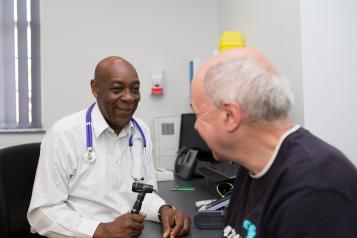Time to get serious about men’s NHS Health Checks

The Government’s consultation on the forthcoming Men’s Health Strategy names cardiovascular disease (CVD) a “big killer” and a priority for improvement. It’s not hard to see why. CVD is the leading cause of death among men in England, and men are more likely than women to die prematurely from it.
One of the key tools the Government has chosen to prevent, detect, and manage CVD is the NHS Health Check. However, our new research shows that too many men are missing out on their check. This is despite legislation requiring local authorities to invite 100% of the eligible population for a Health Check across five years.
We’re calling for change and believe the new Men’s Health Strategy is a good opportunity to act.
The toll of cardiovascular disease on men
CVD covers a range of heart and circulation problems, from inherited conditions to those that develop later in life, such as coronary heart disease - often from unhealthy behaviours, including smoking, drinking and obesity. The most accurate data indicates that in 2023, of the 38,000 people in England who died from CVD under the age of 75, 26,000 (68%) were men.
Geography and deprivation make a big difference. Between 2021 and 2023, the premature mortality rate for CVD in Blackpool was 3.2 times higher than in Hart. People aged 25–44 in the north of England are 47% more likely to die from heart and circulatory diseases than those in the south. CVD is the single biggest driver of the life expectancy gap between the most and least deprived areas.
How the NHS Health Check works
Introduced in 2009, the NHS Health Check should be offered every five years to adults aged 40–74 without a pre-existing long-term condition. However, our findings below indicate that this is not happening for all men.
The check is usually carried out by a nurse at a GP surgery and includes checks on blood pressure, weight, cholesterol, and sometimes blood sugar. The results are used to calculate your risk of developing CVD, and you may be given lifestyle advice, referred to your GP, or offered treatment.
While longer term outcomes data is needed, research shows the programme helps detect risk factors earlier and reduces CVD risk overall. It’s commissioned by local authorities and funded through public health budgets.
The data gap
While the NHS publishes overall data on uptake of the Health Check, it hasn’t published a breakdown of uptake by sex for five years, despite men’s higher risk of CVD. The last figures, from 2017/18, showed women were more likely to attend than men (44% vs 38%).
Our research aimed to plug this gap, especially after a committee of MPs earlier this year criticised the lack of demographic data on Health Check attendance.
Listening to men
To understand what men want from health services and where the gaps are, we commissioned a nationally representative survey. In June 2025, Savanta polled 7,407 adults in England (3,575 men and 3,832 women) about their experiences, attitudes, and perceptions of health and care services.
This included a specific question asked only of respondents aged 40-74 and without a long-term health condition, who comprise those who would be eligible for an NHS Health Check invitation. They made up 988 (unweighted) of the total men polled and their answers reveal some concerning findings:
- The NHS and councils are failing to offer the NHS Health Check to all eligible men.
- There are also worrying gaps in awareness and uptake.
However, the research also includes findings that provide optimism. There are encouraging signs, for example, that when men attend the NHS Health Check they value the experience and are more likely to attend another in the future.
What men told us
Our polling found:
- Only 37% of eligible men said they had ever been invited to an NHS Health Check, and just 31% had been invited in the past five years.
- The proportion of men who had been invited for NHS Health Checks in the last five years was fairly consistent across demographic groups, with the exception of those living in urban areas (32% invited in the last five years) and those living in rural areas (21%).
- Only 59% of men said that they were aware of the Health Check, and less than one in ten men (8%) correctly identified the Health Check eligibility.
- Around 60% of men attended every Health Check they were invited to and most rated the experience positively.
- 69% of men said they would be likely to attend in the future, rising to 85% among those who had been invited before.
Digging into data
Inequalities in uptake
Some groups of men were less likely to say they’d attend in future, including:
- Men struggling financially (63%)
- LGBTQI+ men (62%)
- Younger men aged 18–24 (59%)
Drivers of attendance
Men told us they’d be more likely to attend if:
- They received a call from their doctor at their GP (41%) or another member of staff at their GP surgery (31%)
- They had information about the Health Check before age 40 (23%)
- They could do some tests at home (22%)
- Get results virtually (18%).
Younger and ethnic minority men were more likely to be persuaded by receiving information about the Health Check at their workplace, hearing a public figure share their experience attending an NHS Health Check, flexibility and early awareness.
Our calls for change
The NHS Health Check is a key prevention tool, but only if men are invited, know what it’s for, and feel motivated to attend. Our research shows:
- Awareness drives attendance
- Positive experiences lead to repeat visits
- Direct encouragement from trusted sources makes a difference.
The Government’s 10-year plan places prevention as one of its three top priorities for NHS reform. So we’re urging the Government to include the following recommendations in its Men’s Health Strategy:
- Launch a national awareness campaign targeting men, so they know what the NHS Health Check is for, when they’re eligible and why it’s essential for them to attend. It should take advantage of information through the NHS App and by text message.
- Ensure that all eligible men are invited for a Health Check every five years. There is no accurate national data on how many people are invited to attend the Health Check. The Government should collect data on who is being invited for Health Checks to ensure local authorities comply with their duties to arrange these under legislation.
- Ensure that the Department of Health has meaningful levers it can use to drive improved uptake of Health Checks for men, particularly among the groups at highest risk of developing cardiovascular disease. The Government stated earlier this year that it is to review the relative value of commissioning Health Checks through local authorities against alternative commissioning routes. However, regardless of commissioning routes, stronger direction and oversight are needed from the Government to improve take-up rates and consistency across England.
- Tailor outreach to younger men, ethnic minority men, and those in deprived areas. As part of this, the NHS Health Check PR toolkit should be updated to include PR strategies targeting groups most at risk of CVD.
- Collect and publish demographic-specific uptake data to track progress in taking up Health Check invitations. This will provide a clear starting point for asking why certain men are less likely to take up invitations.
About the poll
Polling carried out by Savanta in June 2025. Unweighted total sample size - 7426 (3575 men and 3832 women).
Weighted total sample size - 7407 (3588 men and 3819 women).
Weighted base used in this blog reflects men, nationally representative weights interlocked by sex.
Advice from Healthwatch Stockport
We want to remind you of our newly published fact sheets, designed to give you quick access to the information you need around different types of screening. These include
Visit all screening fact sheets
Printed versions of the fact sheets are available. Please see the relevant article or contact the team on 0161 974 0753.

